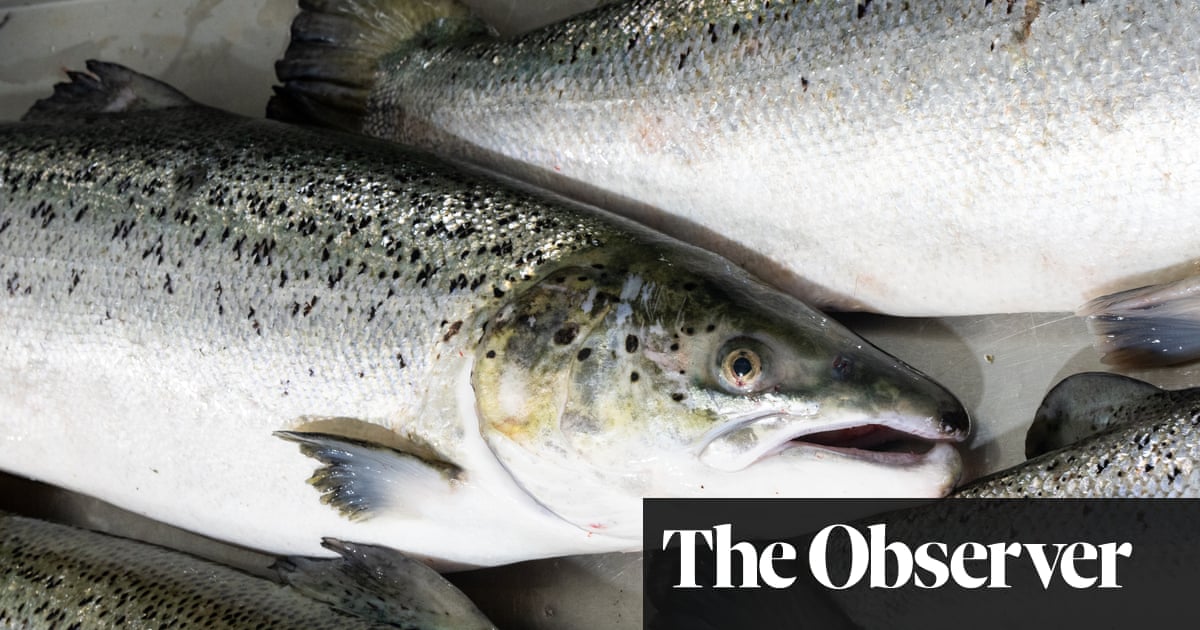
Salmon has undergone a rapid transformation in recent decades. Once a special treat, it is now ubiquitous. From drinks reception canapés to wedding functions, Christmas smoked salmon or simply wrapped in foil and baked on a week night, salmon is everywhere.
Scotland is world renowned for salmon production, and the fish makes up 40% of its total food exports; it is also Britain’s most valuable food export. Healthy, low in saturated fats and high in omega-3, salmon is a success story.
Yet an increasing number of top chefs are turning their back on the pink-fleshed crowdpleaser – called the “chicken of the sea” by some – citing environmental and welfare issues in salmon farming, including concerns over the use of antibiotics and chemicals; the large amounts of wild fish that could otherwise be eaten by humans being used as feed; its role in declining wild salmon populations; and lack of quality.
From Devon to Scotland, restaurants, cafes, galleries and hotels have ditched farmed salmon. They include Grace & Savour, a Michelin-starred venue in Solihull in the West Midlands, zero-waste restaurant Silo in east London, the renowned “nose-to-tail” St John restaurant group, the Tate galleries and the Poco Tapas bar in Bristol, run by Guardian columnist Tom Hunt.
“I think it’s such a poor product, and because of the effect that it has on wild salmon, I won’t serve it,” says Lloyd Morse, head chef at the Palmerston restaurant in Edinburgh.
Britain’s wild Atlantic salmon population has dropped drastically since the 1970s, says Matt Palmer of WildFish, a charity encouraging restaurants to join its “Off the table” campaign, which has more than 150 restaurants on board. “Industrial salmon farming is one of the causes linked to this decline.”
Palmer, who previously worked as a vet on salmon farms, cites parasitic sea lice that build up in farms and can disperse and infect wild salmon and sea trout, with sometimes fatal consequences.
A report by Scotland’s Fish Health Inspectorate found that deaths on Scottish fish farms almost doubled in 2022 compared with the year before, to 15m. Rising sea temperatures and micro-jellyfish are thought to be behind an 18% drop in farmed salmon this year, and critics argue that overcrowding and the slaughter of fish before they are fully grown is unethical.
Salmon Scotland, the voice of the Scottish salmon sector, argues that sea lice affect both farm-raised and wild salmon and that other factors lie behind the decline in wild salmon, including water quality, the climate crisis and the loss of habitats. It also says stocking densities of Scottish salmon are among the lowest in the world.
At the Lost Kitchen in Tiverton, Devon, salmon was a longstanding menu stalwart. The 80-seat restaurant focuses on wood-fired cookery and hot-smoked its own salmon, which was a favourite among customers. “Salmon is a large, fleshy fish that cooks really well,” says manager and co-founder George Aykroyd. “It can be really delicate. A high heat means you seal the outside quicker and keep moisture inside to get a steamed, soft centre.”
But in March, the restaurant ditched one of its most popular offerings. “We decided there’s so much information out there and we have a responsibility as a business,” says Aykroyd. “It’s not about the salmon, but the production of it. Salmon in large nets in small quantities in the sea is a good thing, but now it seems it’s small nets and large quantities of salmon.”
Cornish farmed trout has been an almost seamless swap, even if around a third of customers initially asked why salmon was removed. Trout is now a bestseller and not one guest has grumbled after trying it. “We felt it was more sensible to use a very small fish farm in Cornwall who do trout in freshwater,” says Aykroyd. “We’ve visited and seen it.”
Morse grew up in Australia and was surprised by the amount of salmon in Britain. “It’s massively prevalent here,” he says. According to the Marine Conservation Society (MCS), salmon is the most widely consumed fish in the UK and, as with chicken before it, more intensive farming has fuelled increased appetites. “There was a big thing about caged hens in the 90s – why isn’t there the same comparison here?” says Morse.
One of Morse’s main gripes, aside from his environmental concerns, is that it is a “terrible product”. Instead, he uses wild sea trout when in season: “They’re stunning, delicious – it’s chalk and cheese.” Rather than smoked salmon, he has offered cured turbot and hake and salted cod.
Chantelle Nicholson, chef-owner of the sustainable central London restaurant Apricity, used to serve salmon regularly at her previous venue, Tredwells. “It’s popular. If you put it on the menu, it sells,” she says. But the reported use of antibiotics inspired her to remove the fish.
“There’s some really good alternatives now. Chalk stream trout is similar but has a much better flavour and a lovely buttery texture,” says Nicholson, who opts mainly for line-caught mackerel and mussels for her seafood offering.
Salmon Scotland says that 95% of seawater farms did not use antibiotics at all in 2021.Neither the MCS nor the Marine Stewardship Council advocate a blanket boycott. The MCS rates organic and Aquaculture Stewardship Council-certified Atlantic salmon as “green” in its traffic light system, with most other farmed salmon rated “amber”, meaning improvements are needed.
The MSC’s sustainable blue tick applies only to wild salmon products, mostly from North America.
“Scottish salmon is the UK’s most popular fish and the country’s No 1 food export,” says Tavish Scott, chief executive of Salmon Scotland. He adds: “With domestic and global demand for Scottish salmon continuing to grow, the success of the Scottish salmon sector – and the jobs that depend on it – will not be put at risk from a handful of urban-based activist chefs.”












